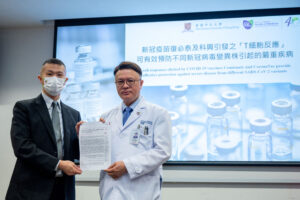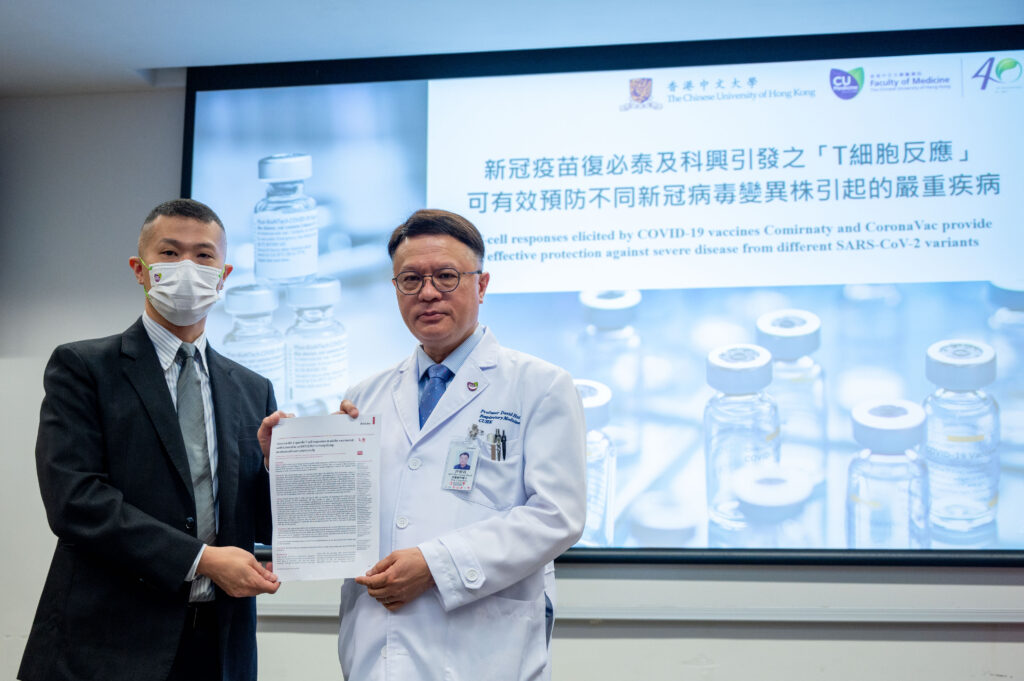CUHK
News Centre
T-cell responses elicited by COVID-19 vaccines Comirnaty and CoronaVac provide effective protection against severe disease from different SARS-CoV-2 variants
A recent study conducted by The Chinese University of Hong Kong (CUHK)’s Faculty of Medicine (CU Medicine) found that mRNA vaccines (Comirnaty) and inactivated vaccines (CoronaVac) can elicit effective T-cell responses to Omicron variants, explaining the high effectiveness of vaccines in reducing death and the severity of illness caused by the new Omicron subvariants. Memory T cells for Omicron were found in all vaccine strategies investigated in the study. They were immediately reactivated during a new SARS-CoV-2 infection, indicating long-term protection. This shows that the use of either Comirnaty or CoronaVac can be considered in policies for global COVID-19 control that aim to reduce disease severity and death. Study findings have been published in the leading journal The Lancet Microbe.
T cells are essential for controlling disease progression
Vaccines are used in public health responses to SARS-CoV-2 variants of concern to reduce the incidence of severe disease, for which T-cell responses are essential. T cells reduce virus replication by eliminating virus-infected cells and control disease progression, though they might not be the major immune component that prevents infection. In view of the paucity of data on vaccine-induced T-cell immunity to Omicron, CU Medicine’s research team conducted a study to compare SARS-CoV-2 Omicron-specific T-cell responses in adults vaccinated with Comirnaty or CoronaVac, the two most widely used COVID-19 vaccines in the world.
Study findings provide insights for policies for global COVID-19 control
The study recruited 659 participants from three vaccination centres in Hong Kong. They either received two doses of Comirnaty or CoronaVac, with a homologous or heterologous booster or without a booster, or had been infected with any type of SARS-CoV-2. Their blood samples were collected before vaccination, one month after vaccination, and during convalescence for infected people.
Here are the key findings:
- Two doses of either Comirnaty or CoronaVac vaccine elicited large Omicron-specific CD4+ and CD8+ T-cell responses compared with the response in people before vaccination, though it is known that two doses of either vaccine fail to induce neutralising antibodies against Omicron.
- Two doses of Comirnaty induced higher Omicron-specific CD4+ and CD8+ T-cell responses in adults aged 60 years or older than CoronaVac.
- A third dose of Comirnaty or CoronaVac boosted waning T-cell responses compared with responses before the third dose, but response levels did not exceed those seen one month after the second dose.
- Memory phenotypes were identified in both CD4+ and CD8+ T cells after two doses of Comirnaty or CoronaVac vaccine, suggesting that both can provide long-term protection.
Professor David Hui Shu-cheong, Stanley Ho Professor of Respiratory Medicine and Chairman of the Department of Medicine and Therapeutics at CU Medicine, stated, “This is the first large-scale, head-to-head, comparative study on T-cell immune responses elicited by the Comirnaty and CoronaVac vaccines among vaccinated people in the community. Our findings suggest either vaccine can activate T-cell responses to SARS-CoV-2 and its variants, and should be administered across the population, especially those at high risk of complications, like older people.”
Notably, memory T cells for Omicron were found in all vaccine strategies investigated in the study. “Memory T cells migrate into tissue and reactivate during a new SARS-CoV-2 infection. Therefore, these T-cell responses might continue to be effective and protective against severe disease from different variants for a long period of time,” explained Professor Hui.
Professor Chris Mok Ka-pun, Assistant Professor in The Jockey Club School of Public Health and Primary Care at CU Medicine, added, “Our data also partly explain the mechanism of the vaccine protection induced by CoronaVac, despite its relatively poor Omicron neutralising antibody responses. Even CoronaVac as a booster dose provides a boost to waning T-cell immunity.”
The research was funded by the Hong Kong government’s Health and Medical Research Fund. The original study can be accessed at: https://doi.org/10.1016/S2666-5247(23)00006-X.

A recent study conducted by CU Medicine found that COVID-19 vaccines Comirnaty and CoronaVac can elicit effective T-cell responses to Omicron variants, explaining the high effectiveness of vaccines in reducing death and the severity of illness caused by the new Omicron subvariants.
(From left) Professor Chris Mok, Assistant Professor in The Jockey Club School of Public Health and Primary Care; and Professor David Hui, Stanley Ho Professor of Respiratory Medicine and Chairman of the Department of Medicine and Therapeutics, at CU Medicine.






